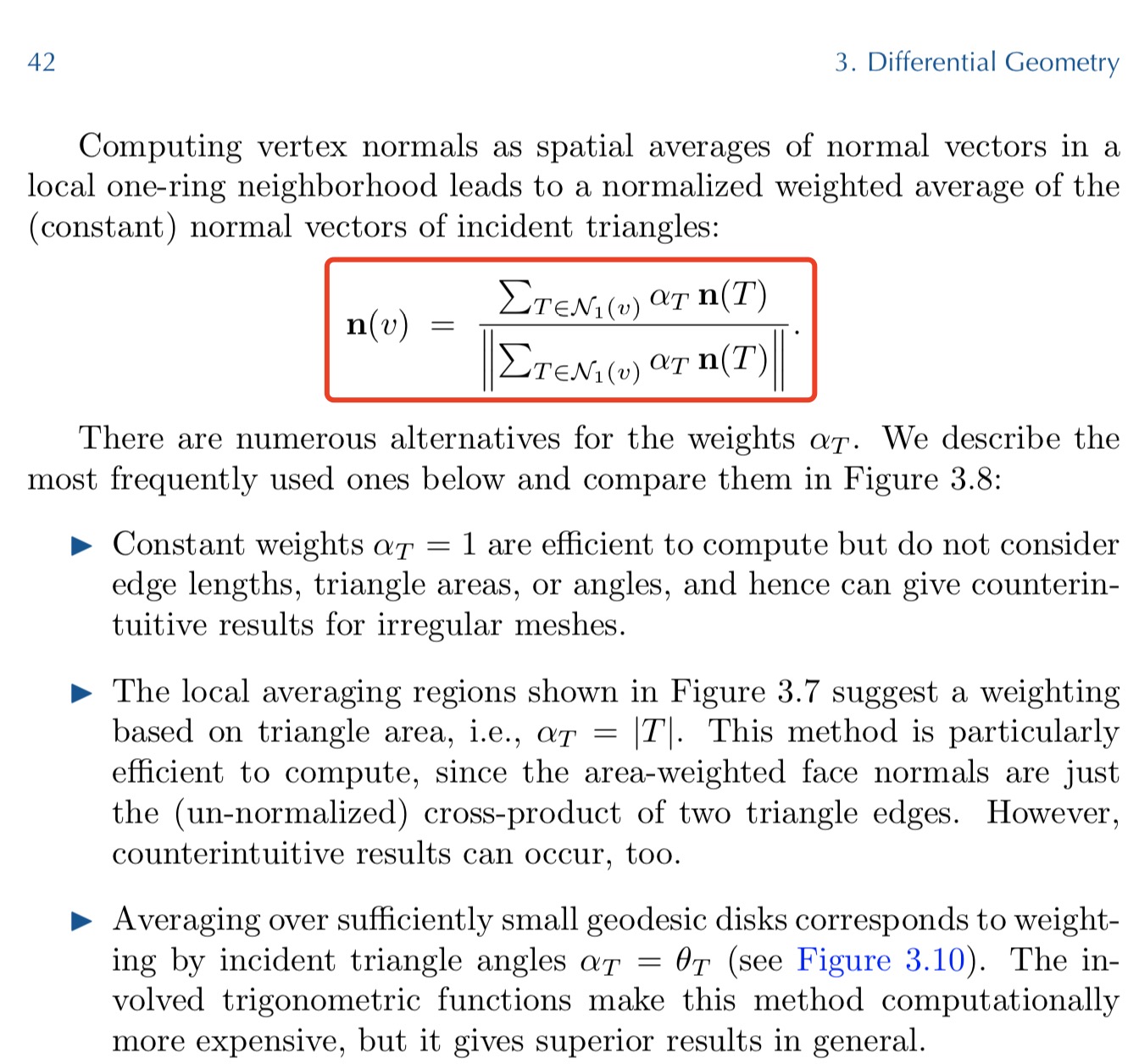An example from Polygon Mesh Processing page 42
The original equation:

I❤️LA implementation:
given
α_T : ℝ
n_T : ℝ³
`n(v)` = ( ∑_(T for T ∈ `N₁`_v) α_T n_T )/‖ ∑_(T for T ∈ `N₁`_v) α_T n_T ‖
where
v ∈ ℤ
`N₁`_i ∈ {ℤ}I❤️LA compiled to C++/Eigen:
/*
given
α_T : ℝ
n_T : ℝ³
`n(v)` = ( ∑_(T for T ∈ `N₁`_v) α_T n_T )/‖ ∑_(T for T ∈ `N₁`_v) α_T n_T ‖
where
v ∈ ℤ
`N₁`_i ∈ {ℤ}
*/
#include <Eigen/Core>
#include <Eigen/Dense>
#include <Eigen/Sparse>
#include <iostream>
#include <set>
struct pmp_42ResultType {
Eigen::Matrix<double, 3, 1> n_left_parenthesis_v_right_parenthesis;
pmp_42ResultType(const Eigen::Matrix<double, 3, 1> & n_left_parenthesis_v_right_parenthesis)
: n_left_parenthesis_v_right_parenthesis(n_left_parenthesis_v_right_parenthesis)
{}
};
/**
* pmp_42
*
* @param α ℝ
* @param n ℝ³
* @return n_left_parenthesis_v_right_parenthesis
*/
pmp_42ResultType pmp_42(
const std::vector<double> & α,
const std::vector<Eigen::Matrix<double, 3, 1>> & n,
const int & v,
const std::vector<std::set<int >> & N₁)
{
const long dim_0 = α.size();
const long dim_1 = N₁.size();
assert( n.size() == dim_0 );
Eigen::MatrixXd sum_0 = Eigen::MatrixXd::Zero(3, 1);
for(int T=1; T<=n.size(); T++){
std::set<int > set_0 = N₁.at(v-1);
if(set_0.find(int(T)) != set_0.end()){
sum_0 += α.at(T-1) * n.at(T-1);
}
}
Eigen::MatrixXd sum_1 = Eigen::MatrixXd::Zero(3, 1);
for(int T=1; T<=n.size(); T++){
std::set<int > set_1 = N₁.at(v-1);
if(set_1.find(int(T)) != set_1.end()){
sum_1 += α.at(T-1) * n.at(T-1);
}
}
Eigen::Matrix<double, 3, 1> n_left_parenthesis_v_right_parenthesis = (sum_0) / double((sum_1).lpNorm<2>());
return pmp_42ResultType(n_left_parenthesis_v_right_parenthesis);
}
void generateRandomData(std::vector<double> & α,
std::vector<Eigen::Matrix<double, 3, 1>> & n,
int & v,
std::vector<std::set<int >> & N₁)
{
v = rand() % 10;
const int dim_0 = rand()%10;
const int dim_1 = rand()%10;
α.resize(dim_0);
for(int i=0; i<dim_0; i++){
α[i] = rand() % 10;
}
n.resize(dim_0);
for(int i=0; i<dim_0; i++){
n[i] = Eigen::VectorXd::Random(3);
}
N₁.resize(dim_1);
for(int i=0; i<dim_1; i++){
const int dim_3 = rand()%10;
for(int j=0; j<dim_3; j++){
N₁[i].insert(rand()%10);
}
}
}
int main(int argc, char *argv[])
{
srand((int)time(NULL));
std::vector<double> α;
std::vector<Eigen::Matrix<double, 3, 1>> n;
int v;
std::vector<std::set<int >> N₁;
generateRandomData(α, n, v, N₁);
pmp_42ResultType func_value = pmp_42(α, n, v, N₁);
std::cout<<"return value:\n"<<func_value.n_left_parenthesis_v_right_parenthesis<<std::endl;
return 0;
}I❤️LA compiled to Python/NumPy/SciPy:
"""
given
α_T : ℝ
n_T : ℝ³
`n(v)` = ( ∑_(T for T ∈ `N₁`_v) α_T n_T )/‖ ∑_(T for T ∈ `N₁`_v) α_T n_T ‖
where
v ∈ ℤ
`N₁`_i ∈ {ℤ}
"""
import numpy as np
import scipy
import scipy.linalg
from scipy import sparse
from scipy.integrate import quad
from scipy.optimize import minimize
class pmp_42ResultType:
def __init__( self, n_left_parenthesis_v_right_parenthesis):
self.n_left_parenthesis_v_right_parenthesis = n_left_parenthesis_v_right_parenthesis
def pmp_42(α, n, v, N1):
"""
:param :α : ℝ
:param :n : ℝ³
"""
α = np.asarray(α, dtype=np.float64)
n = np.asarray(n, dtype=np.float64)
dim_0 = α.shape[0]
dim_1 = N1.shape[0]
assert α.shape == (dim_0,)
assert n.shape == (dim_0, 3, )
assert np.ndim(v) == 0
sum_0 = np.zeros((3, ))
for T in range(1, len(n)+1):
if((T) in N1[v-1]):
sum_0 += α[T-1] * n[T-1]
sum_1 = np.zeros((3, ))
for T in range(1, len(n)+1):
if((T) in N1[v-1]):
sum_1 += α[T-1] * n[T-1]
n_left_parenthesis_v_right_parenthesis = (sum_0) / np.linalg.norm(sum_1, 2)
return pmp_42ResultType(n_left_parenthesis_v_right_parenthesis)
def generateRandomData():
v = np.random.randint(10)
dim_0 = np.random.randint(10)
dim_1 = np.random.randint(10)
α = np.random.randn(dim_0)
n = np.random.randn(dim_0, 3, )
N1 = []
for i in range(dim_1):
N1_tmp = []
dim_2 = np.random.randint(1, 10)
for j in range(dim_2):
N1_tmp.append((np.random.randint(10)))
N1.append(N1_tmp)
N1 = np.asarray(N1)
return α, n, v, N1
if __name__ == '__main__':
α, n, v, N1 = generateRandomData()
print("α:", α)
print("n:", n)
print("v:", v)
print("N1:", N1)
func_value = pmp_42(α, n, v, N1)
print("return value: ", func_value.n_left_parenthesis_v_right_parenthesis)I❤️LA compiled to MATLAB:
function output = pmp_42(alpha, n, v, N1)
% output = pmp_42(α, n, v, `N₁`)
%
% given
% α_T : ℝ
% n_T : ℝ³
%
% `n(v)` = ( ∑_(T for T ∈ `N₁`_v) α_T n_T )/‖ ∑_(T for T ∈ `N₁`_v) α_T n_T ‖
%
% where
% v ∈ ℤ
% `N₁`_i ∈ {ℤ}
if nargin==0
warning('generating random input data');
[alpha, n, v, N1] = generateRandomData();
end
function [alpha, n, v, N1] = generateRandomData()
v = randi(10);
dim_0 = randi(10);
dim_1 = randi(10);
alpha = randn(dim_0,1);
n = randn(dim_0,3);
N1 = {};
for i = 1:dim_1
N1_tmp = [];
dim_4 = randi(10);
for j = 1:dim_4
N1_tmp = [N1_tmp;randi(10)];
end
N1 = [N1, N1_tmp];
end
end
alpha = reshape(alpha,[],1);
dim_0 = size(alpha, 1);
dim_1 = size(N1, 1);
assert( size(alpha,1) == dim_0 );
assert( isequal(size(n), [dim_0, 3]) );
assert(numel(v) == 1);
sum_0 = zeros(3,1);
for T = 1:size(n, 1)
if ismember([T],N1{v},'rows')
sum_0 = sum_0 + alpha(T) * n(T,:)';
end
end
sum_1 = zeros(3,1);
for T = 1:size(n, 1)
if ismember([T],N1{v},'rows')
sum_1 = sum_1 + alpha(T) * n(T,:)';
end
end
n_v = (sum_0) / norm(sum_1, 2);
output.n_v = n_v;
end
I❤️LA compiled to LaTeX:
\documentclass[12pt]{article}
\usepackage{mathdots}
\usepackage[bb=boondox]{mathalfa}
\usepackage{mathtools}
\usepackage{amssymb}
\usepackage{libertine}
\DeclareMathOperator*{\argmax}{arg\,max}
\DeclareMathOperator*{\argmin}{arg\,min}
\usepackage[paperheight=8in,paperwidth=4in,margin=.3in,heightrounded]{geometry}
\let\originalleft\left
\let\originalright\right
\renewcommand{\left}{\mathopen{}\mathclose\bgroup\originalleft}
\renewcommand{\right}{\aftergroup\egroup\originalright}
\begin{document}
\begin{center}
\resizebox{\textwidth}{!}
{
\begin{minipage}[c]{\textwidth}
\begin{align*}
\intertext{given}
\mathit{α}_{\mathit{T}} & \in \mathbb{R} \\
\mathit{n}_{\mathit{T}} & \in \mathbb{R}^{ 3} \\
\\
\textit{n(v)} & = \frac{\sum_{\mathit{T} \in \textit{N₁}_{ \mathit{v} } } \mathit{α}_{ \mathit{T} }\mathit{n}_{ \mathit{T} }}{\left\|\sum_{\mathit{T} \in \textit{N₁}_{ \mathit{v} } } \mathit{α}_{ \mathit{T} }\mathit{n}_{ \mathit{T} }\right\|_2} \\
\intertext{where}
\mathit{v} & \in \mathbb{Z} \\
\textit{N₁}_{\mathit{i}} & \in \{\mathbb{Z}\} \\
\\
\end{align*}
\end{minipage}
}
\end{center}
\end{document}
I❤️LA LaTeX output: